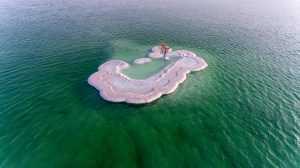
20 Christian Pilgrimage Sites in Israel: The Guidebook
Israel, often called the birthplace of Christianity, is a land steeped in history, holding deep significance for believers. Christian pilgrimage sites abound in this small
When should you plan your trip and why visit Israel? There are many opinions about this, and it’s mostly a matter of personal preference. Some people prefer the winter because they like to ski, while others want to spend their time at some of Israel’s beaches, so they go during the summer months. However, no matter when you decide to visit, there are some major cultural events that you can’t miss if you want to experience all that Israel has to offer. These events draw large crowds and make it difficult to get a hotel room in major cities such as Jerusalem and Tel Aviv.
If you don’t mind cooler weather, winter can be a great time to visit Israel. The country is less crowded than in the summer, and flights are typically cheaper. Plus, you can celebrate Hanukkah and Christmas in Jerusalem and Tel Aviv. You’ll also have access to all of the skiing and snowboarding resorts in the north of Israel if you’re up for an active holiday break. And since Jerusalem and Tel Aviv are considered temperate cities with good climates year-round, this is a good option for visitors who aren’t big fans of hot weather.

The weather in Israel is mild in the spring, making it a great time to visit. You can expect more tourism during this time, but not so much that you’ll feel overwhelmed. Plus, the temperatures are warm but not too hot, making it comfortable to explore all the sights. Three essential cities to visit include Jerusalem, Eilat, and Tel Aviv. There are plenty of opportunities to take part in cultural events in the capital, on the Red Sea, or anywhere else. For example, Jerusalem hosts an annual marathon with over 30,000 participants every March! Because of this it is smart to have a good travel guide for Israel ahead of your travels.
With its beaches and deserts, visitors will have plenty of natural beauty to see while they’re here. Other highlights include hiking through the desert on Mount Sinai (Mount Horeb) or exploring ancient ruins at Megiddo. Visit any time from March-May for springtime’s milder climate without summer’s heat. If you plan your trip around April 25th – Independence Day – be sure to get ready for one of the most beautiful days in Israel. In Tel Aviv, enjoy a tour of some historical sites before heading out to sea. If you’re looking for even more water activities, head north along the coast and dip your toes into Eilat’s beautiful blue waters.

Israel is a great destination for a summer vacation. The weather is hot, but the evenings are cooler in Jerusalem and Tel Aviv. Tel Aviv offers beaches, hiking, and endless things to see. There are also many cultural attractions and events to enjoy during the summer months. You’ll want to be sure you stay hydrated while traveling through this beautiful country. It may be helpful to carry along a small, refillable water bottle so that you can easily access water without buying an expensive drink from the airport or hotel.
Even though temperatures in Tel Aviv often reach 90 degrees Fahrenheit (32 degrees Celsius), humidity will make it feel much hotter than that! Jerusalem has cooler evenings, making it a more comfortable choice if you don’t like hot weather. If heat isn’t your thing then November is the best time to visit Israel – October is still pretty warm but there’s less chance of being really cold. Read more on climate and temperature in Israel, as well as what to wear when visiting Israel by clicking here.

The weather is pleasant, the Jewish holidays are in full swing, and the cultural sights and religious sites are open and waiting to be explored. This is the perfect time to visit Israel. Fall is also a great time to visit because the weather is not too cold and the days are still long. Plus, there are many events and festivals taking place throughout the country. As far as where to go, we recommend Jerusalem or Tel Aviv. Jerusalem is packed with history and culture while Tel Aviv is more modern with beaches and nightlife that never sleeps. In either city you can find delicious food, beautiful views, and plenty of attractions.
If you want to explore some of the major tourist destinations outside of these two cities, then head out west to see the Dead Sea or incredible hikes near Masada. Southern Israel has countless opportunities for adventure seekers, including desert safaris, ancient archaeological digs, camel rides, and much more. Along the Mediterranean coast you’ll find seaside resorts with world-class golf courses and gorgeous beaches just minutes from Tel Aviv or Jerusalem. No matter what your travel plans are, there’s no better time than now to plan your trip to Israel!

No matter what time of year you visit, there is always something to see and do in Israel. From the beaches of Tel Aviv to the ancient ruins of Jerusalem, there is something for everyone. If you are visiting during summer, enjoy the beautiful Mediterranean climate while taking a dip in the Mediterranean Sea or visiting an outdoor festival. If it’s wintertime, be sure to bundle up and enjoy a stroll through Old Jaffa or spend a day at any one of the country’s beautiful ski resorts. And if it’s springtime, take advantage of all that Israel has to offer with its many popular festivals. Whatever your plans are when visiting Israel, we hope this post helped show you why this destination should be on your list!
Find luxury and unique tours in Israel by clicking here.


Israel, often called the birthplace of Christianity, is a land steeped in history, holding deep significance for believers. Christian pilgrimage sites abound in this small

In the heart of the Middle East lies Jerusalem, a city steeped in history, culture, and religious significance. Positioned at the crossroads of civilizations, Jerusalem

Jerusalem, a city that never sleeps, transforms into a captivating wonderland after dark. From exploring the enchanting Old City streets to indulging in local ice

Welcome to a week-long adventure in Israel! Discover what to do in Israel for a week and immerse yourself in its rich history and diverse
